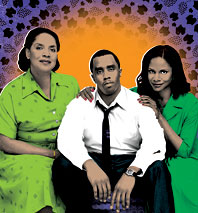
Pauline Kael, always wicked and occasionally wrong, once told readers of Harper’s that the lesson to be learned from A Raisin in the Sun is “that a Negro family can be as dreary as a white family.” This isn’t criticism, of course. It’s more like anthropological slumming, as if Raisin, Death of a Salesman, and Long Day’s Journey Into Night were alternative bus stops in the same despondent boondocks. And yet Kael’s snooty disdain is not much different from the consensus enthusiasm for Lorraine Hansberry’s play. Hasn’t it been so celebrated for 50 years precisely because it suggests that all American families, regardless of color, are deep down alike, with the same wise mama, preferred uplift, and suburban, middle-classy aspirations?
ABC’s three-hour television-movie version of the recent Broadway revival of Raisin, with Phylicia Rashad as the widowed matriarch, Lena Younger; Sean Combs as her son, Walter Lee Jr.; Sanaa Lathan as her daughter, Beneatha; and Audra McDonald as Walter’s wife, Ruth, is a splendid chance to see the play for the complicated creature it’s always been—angry, funny, dreamy, ferocious amidst its ambiguities, at war with and forgiving of the stereotypes it embodies and transcends. As the Youngers wait on the South Side of Chicago for the $10,000 life-insurance check their husband and father died for, notice first that they aren’t middle-class; Lena and Ruth are domestics and Walter a chauffeur. Notice next that the house Lena longs for, out of the ghetto, isn’t in the tony suburbs; it’s among working-class whites in a blue-collar neighborhood. What the Nigerian intellectual Joseph Asagai (David Oyelowo), Beneatha’s surprise suitor, thinks about “integration” and “assimilation” is not exactly “Kumbaya.” And the excitable Beneatha, who has taken lessons in photography, horseback riding, and guitar, who wants to go to medical school and Africa, sounds the several selves of the playwright Hansberry. Young, gifted, and black herself, she admitted of no impediments until cancer took her at age 34.
Obviously, Raisin said prescient things about class and gender that most of us failed to hear in 1959, when it opened on Broadway, or in 1961, when the same cast, with Sidney Poitier and Claudia McNeil, appeared in the film. Some of this failure wasn’t our fault. We only discovered in 1989, when “American Playhouse” mounted a public-TV version with Danny Glover and Esther Rolle, that a number of passages on class, violence, feminism, and African nationalism (not to mention Beneatha’s Afro) had been abbreviated or omitted from the original stage production. They are mostly restored here, too, and more valuable than the attempts to open up the set to the rich interiors and pastoral climes of white employers. Actually, Raisin works well on television, like so many other fifties plays that tended toward the Freudian and claustrophobic, with their Munch-scream close-ups and slammed Ibsen doors.
Phylicia Rashad’s Lena flirts with complacency, perhaps insufficiently troubled by fraying kinships. Sean Combs knows what Walter Lee is supposed to feel, which isn’t the same as our feeling it, too; his crybaby is better than his cynic. Audra McDonald can do no wrong, even when she’s not allowed to sing; Ruth’s visit to the abortionist is a wordless wonder. Sanaa Lathan you may recall from Love and Basketball, where she evoked Yeats on Maud Gonne (“beauty like a tightened bow”); her rash Beneatha stops the heart. There are long sufferings in these little rooms, which may be why the plant is hiding on the fire escape. But there is also a deep choral meditation, as contradictory and creative as the contending views of W.E.B. DuBois and Zora Neale Hurston, of Richard Wright and Ralph Ellison, of Toni Morrison and August Wilson, of Kara Walker’s silhouettes and George C. Wolfe’s Colored Museum. “If I am not who you say I am,” James Baldwin once explained to white America, “then you are not who you think you are.”
Banished
In the latest installment of “Independent Lens,” Peabody-winning documentarian Marco Williams (Two Towns of Jasper) drops in very uninvited on Forsyth County, Georgia, Pierce City, Missouri, and Harrison, Arkansas, where white mob violence expelled entire black communities in the early twentieth century, after which “racial cleansing” they’ve been comfy ever since. Williams brings with him descendants of the dispossessed interested in the bodies of their ancestors, the titles to their expropriated lands, and the scruples and excuses of towns that didn’t want them. The resulting counterpoint of, on the one hand, deed registries and newspaper photographs of lynchings, and, on the other, white-haired, pink-faced good ol’ boys and gals who are not, of course, to be blamed for what their granddaddies did and don’t really see how “reparations” do any good in the long run, anyway, would be hilarious if it weren’t obscene. Don’t miss the Klan, talking on camera.
Joe Louis: America’s Hero … Betrayed
Everybody from Dick Gregory, Bill Cosby, and Maya Angelou to Jimmy Carter, Jerry Lewis, and Gay Talese gets to talk about Joe Louis, a.k.a. “the Brown Bomber,” including his son, his several biographers, Rocky Marciano’s brother, and the former sports editor of The Daily Worker. This, with the usual first-rate archival work of HBO Sports, is the infuriating story of a sharecropper’s son who thought he had actually become an American when he knocked out Nazi favorite Max Schmeling in the first round in Yankee Stadium in 1938. Louis lost years of championship purses by enlisting in the U.S. Army a month after Pearl Harbor, was betrayed by his racketeer management team, and then joined a circus act—selling hair pomade and cigarettes; pro wrestling—after being hounded by a vengeful IRS that treated him like Al Capone. He wound up a greeter in Las Vegas and a cocaine-addled paranoid.
A Raisin in the Sun
ABC. Monday, February 25, at 8 p.m.
Banished
Channel 13. February 22, 10 p.m.
Joe Louis: America’s Hero … Betrayed
HBO. February 23, 8 p.m.